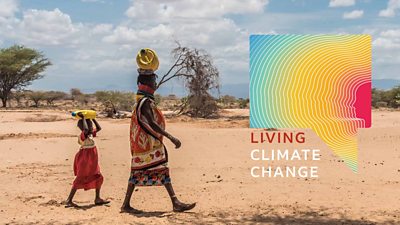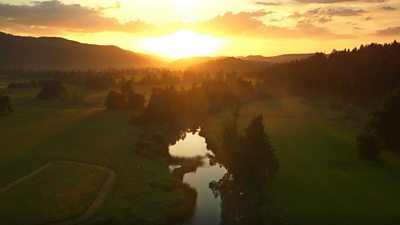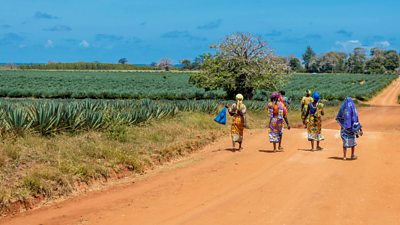PRESS RELEASE
The health and livelihoods of millions of people across sub-Saharan Africa and Asia are jeopardised by increasingly extreme weather conditions linked to climate change. Alongside the COP26 climate conference, a new ΒιΆΉΤΌΕΔ Media Action film series supported by Wellcome is telling some of their stories.
βIt used to snow a lot here and it was good for farming and for our health. Rain has replaced the snow. Heavy rain has polluted our water sources. I wonder how miserable the lives of our children will be in the future. I wonder what kinds of diseases new generations will have to deal with.β
Angyel Jung Bista, an apple farmer in the village of Kabgeni in Nepal, is one of the people featured in a series of stories from communities in Bangladesh, Kenya and Nepal, exposing how the consequences of climate change are already affecting lives and health around the world.
The Living Climate Change short film series was produced by ΒιΆΉΤΌΕΔ Media Actionβs Edward Kargbo and with funding support from Wellcome. As the UN climate conference COP26 is underway, these six films, made by ΒιΆΉΤΌΕΔ Media Actionβs local production teams, also highlight the crucial role of media in elevating the voices of those most affected, who might not otherwise be heard by global leaders.
ΒιΆΉΤΌΕΔ Media Action Chief Executive Caroline Nursey said:
βThe film series brings together first-person stories from people in dramatically different locations and circumstances, all with similar messages: climate change threatens the health and well-being of communities around the world. Those most affected are often the people who are least likely to have a voice on the international and political stage. With COP26 now underway, and many people from the most-affected regions unable to attend in person, media and communication are essential to make sure that their experiences and insights are heard.β
Wellcome Associate Director for Public Engagement Lara Clements said:
βClimate change is one of the most urgent health challenges of our time. Heatstroke, still births, the spread of infectious diseases such as malaria - these are just some of the impacts of hotter temperatures, rising sea levels and flooding. These films demonstrate the real-life impact of the crisis on different communities and show their hopes for change. They also remind us of the power of media in amplifying voices of people struggling with the consequences of climate change.
βTo ensure a sustainable future for everyone requires all of us working together β science, government, business, civil society β both today and for the decades to come.β
Among the stories featured in the films:
- In Bangladesh, increased levels of salt in fresh water are contributing to reproductive health problems and cardiovascular diseases including hypertension. Shabjan Begum, who lives in a fishing village on the southern coast reliant on the saline water for food, water and fishing, has high blood pressure and speaks of her own tragic experience with stillbirth.
- In Bangladesh, Nazma Begum, a garment factory worker, moved to the slums of Dhaka after her village was affected by flooding and river erosion, and reflects on the impact of extreme heat on her health and livelihood. Climate change is expected to contribute to the migration of an estimated 200 million people by 2050; studies also show extreme heat contributes to increased risk of death and illness β particularly from heart and lung ailments β and adversely affects pregnant women.
- In Kenya, pastoralist Esther Elaar, who is pregnant, regularly walks over two hours a day to the closest source of water, and carries a full 20-litre jerrycan back, as prolonged droughts and changing weather patterns affect the region. Over 3 billion people live in regions that are water-scarce at least one month per year, with disproportionate health impacts on women, who are more often responsible for collecting water.
- In Kenya, pastoralist Lomilio Ewoi lost his herd of nearly 1,000 goats β and his livelihood and status in the community β in a flood. He shares his moving story of how this has affected his mental health. In June 2020, the Kenyan government announced a national mental health emergency, citing climate change as one of the drivers of skyrocketing rates of depression and anxiety.
- In far western Nepal, community health volunteer Parbati Bhat shares how she has encountered malaria cases in her village for the first time in more than 30 years. βWhen I became a health volunteer, Iβd only tend to pregnant women and children. Now I have to tend to malaria patients as well.β The Lancet has suggested climate change could contribute to wider transmission of malaria and dengue, by expanding the habitat of mosquitoes and extending the seasons in which they thrive.
The films also show how communities are working together to adapt β such as health workers sharing knowledge of boiling water before drinking it and using mosquito nets in places that have never before experienced malaria, and neighbours sharing resources after losses due to flooding and drought. The films provoke reflection on what the future holds, if world leaders do not take adequate action to address climate change.
In Dhaka, Nazma Begum still has hope for her four-year-old daughterβs future: βWe have been living in the slum for around 10 years. Iβm planning for the future. Iβll educate my daughter and raise her properly.β
/ends
For more information please contact:
Carolynne Wheeler, Head of Communications, on +447903117715 or carolynne.wheeler@bbc.co.uk
About ΒιΆΉΤΌΕΔ Media Action:
ΒιΆΉΤΌΕΔ Media Action is the ΒιΆΉΤΌΕΔβs international charity, working in more than 20 countries. Last year we reached more than 130 million people, supporting independent media and sharing trusted information that protects health, bridges divides, challenges prejudice, and saves and changes lives. We follow the editorial standards and values of the ΒιΆΉΤΌΕΔ, but we rely on donor funding to carry out our work. To find out more, please see bbcmediaaction.org.
About Wellcome
Wellcome supports science to solve the urgent health challenges facing everyone. We support discovery research into life, health and wellbeing, and weβre taking on three worldwide health challenges: mental health, global heating and infectious diseases.
Watch the series
-
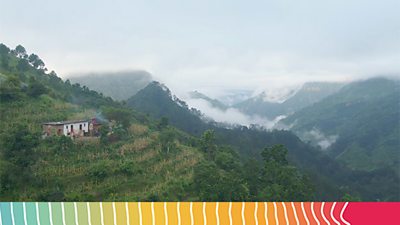
Mosquitoes in the mountains, Nepal
Mosquitoes and mosquito-borne diseases like malaria used to be confined to low-lying areas of Nepal. But in the last three years, there have been over 900 cases of malaria in the mountain regions. Parbati Bhat, who has been a community health volunteer for 38 years, says treating malaria cases has now become a new part of her role. -

The flood that took everything, Kenya
The consequences of extreme and unpredictable weather conditions can take a severe toll on mental health, as well as physical health. Pastoralist Lomilio Ewoi Erot lost his livelihood when his herd of hundreds of goats was swept away in a flood; he speaks of his struggles with mental health after becoming unable to provide for his family. -
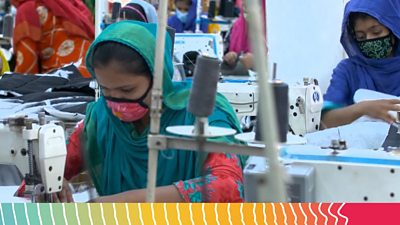
Feeling the heat, Bangladesh
Increasing temperatures, particularly in big cities like Dhaka, the capital of Bangladesh, have profound effects on human health. Nazma Begum, who lives in a slum in Dhaka, described the impact of working 14 hours a day in an overheated garment factory, while others suffer from skin conditions and heatstroke. -
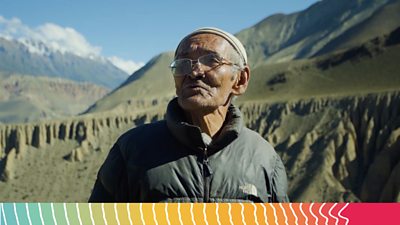
When snow becomes rain, Nepal
Climate change is destabilising food production in many parts of the world. Angyel Jung Bista, an apple farmer in the village of Kabgeni in Nepal, struggles to grow apples as warmer weather, heavy rainfall and floods pollute the water, prevent apples from growing, and contribute to the spread of waterborne diseases. -

The long walk to water, Kenya
Pregnant Kenyan mother Esther Elaar walks over two hours a day to get to a water source, then carries a heavy, 20-litre jerrycan all the way home again. Prolonged droughts and changing weather patterns driven by climate change have made everyday life an increasing struggle for people in northern Kenya. Women in the region have noticed an increase in miscarriages and stillbirths which they attribute to the extreme conditions. -
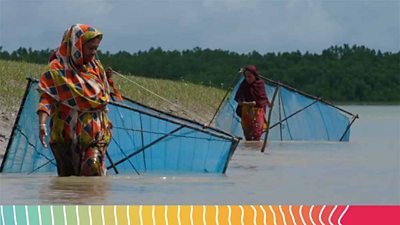
Salt in the water, Bangladesh
In coastal regions in Bangladesh, increased levels of salt in fresh water are contributing to reproductive health problems and cardiovascular diseases. Shabjan Begum, who lives in a fishing village on the southern coast reliant on the saline water for food, water and fishing, knows these health risks first-hand, through her own experience and that of her family and neighbours.
Behind the scenes
-
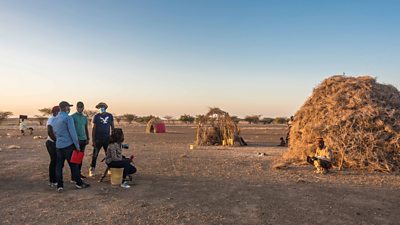
Behind the scenes in Kenya
Our project director Diana Njeru shares her reflections on extreme heat and drought, and their impacts on health, in northern Kenya. -

Behind the scenes in Nepal
Our communications manager, Om Rai, reflects on the journeys to meet Angyel Bista and Parbati Bhat. -
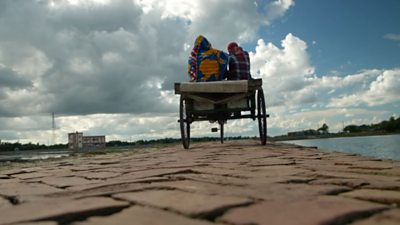
Behind the scenes in Bangladesh
Film producer Polash Rosul and Head of Production Bishawjit Das share the storygathering process behind our Living Climate Change series in Bangladesh.

